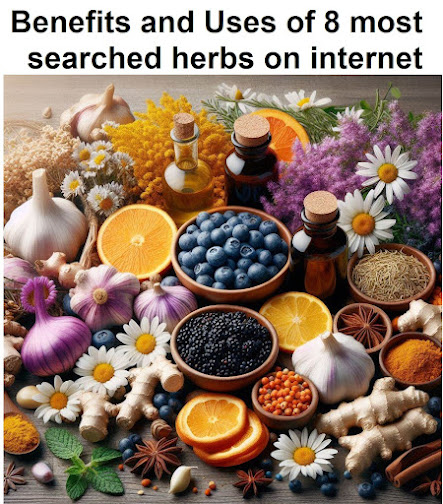Most searched herbs on the web - Benefits and Uses
The medicinal properties, uses, and benefits of each of these herbs are given hereunder:
.jpg)
Echinacea:
- What it is: Echinacea, also known as purple coneflower, belongs to a group of flowering plants native to North America.
- Medicinal Properties:
- Rich in antioxidants, it supports immunity and may help reduce inflammation.
- Contains compounds like flavonoids and rosmarinic acid.
- Uses and Benefits:
- Traditionally used by Native Americans for various ailments.
- Over-the-counter remedy for the common cold, flu, pain, and migraines.
- May aid in immune system function
Garlic:
- What it is: Garlic, a pungent bulb, has been used for centuries in various cultures.
- Medicinal Properties:
- Contains allicin, which has anti-inflammatory and antioxidant effects.
- Supports cardiovascular health and may help reduce blood pressure and cholesterol.
- Uses and Benefits:
- Used to treat nausea, infections, and respiratory issues.
- May aid weight loss and improve memory.
- Antioxidant properties protect against oxidative damage.
Ginger:
- What it is: Ginger, from Southeast Asia, is related to turmeric and cardamom.
- Medicinal Properties:
- Contains gingerol, an anti-inflammatory compound.
- Boosts immunity and aids digestion.
- Uses and Benefits:
- Helps with nausea, including morning sickness.
- May aid weight loss and improve brain health.
- Fights inflammation and has antioxidant effects.
Valerian:
- What it is: Valerian, a perennial plant, has been used since ancient times.
- Medicinal Properties:
- Contains valerenic acid with sedative effects.
- Used for insomnia, nervous tension, and anxiety.
- Uses and Benefits:
- Promotes relaxation and sleep.
- Historically used for various conditions.
- Safety data limited; consult a doctor before use.
Turmeric:
- What it is: Turmeric, a spice, contains curcumin as its active compound.
- Medicinal Properties:
- Curcumin has anti-inflammatory and antioxidant effects.
- Enhances brain health and fights free radicals.
- Uses and Benefits:
- Supports joint health and may prevent cancer.
- Improves memory and helps manage depression.
- Often used in curries and supplements.
German Chamomile:
- What it is: German chamomile is an herb with daisy-like flowers.
- Medicinal Properties:
- Contains chamazulene, an anti-inflammatory compound.
- Used for relaxation and soothing effects.
- Uses and Benefits:
- Promotes calmness and eases anxiety.
- Supports digestive health and skin conditions.
- Commonly brewed as a tea.
Elder Berry:
- What it is: Elderberry comes from the elder tree.
- Medicinal Properties:
- Rich in antioxidants and flavonoids.
- Supports immune function.
- Uses and Benefits:
- Traditionally used for colds and flu.
- May reduce symptoms and duration of illness.
- Available as syrups, teas, and supplements.
Ashwagandha:
- What it is: Ashwagandha, an adaptogenic herb, has been used in Ayurvedic medicine.
- Medicinal Properties:
- Contains withanolides, which have stress-reducing effects.
- Supports adrenal health and balances hormones.
- Uses and Benefits:
- Helps manage stress and anxiety.
- Enhances energy levels and cognitive function.
- Available as capsules or powders.
Remember to consult a healthcare professional before using any herbs or supplements, especially if you have specific health conditions or are taking medications. Each herb has unique properties, and individual responses may vary.
No comments:
Post a Comment